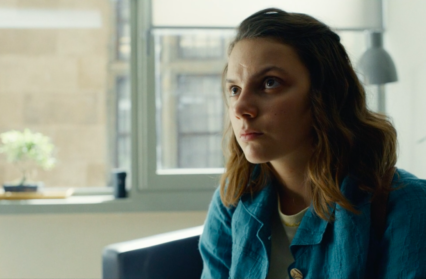The BBC is back with His Dark Materials Season Two; join Caragh Medlicott for weekly reviews of each new episode.
Warning: this review contains spoilers.

There may be no place like home, but in His Dark Materials, there are close replicas. In episode 2 – ‘The Cave’ – we’re back in our world, or at least Will’s Oxford (which is the closest thing to it). There are cars, traffic lights and revolving doors. Lyra’s daemon, Pan, is demoted to a backpack. A swashbuckling first episode out the way and HDM must begin some heavy lifting, steering into the realm of religious politics and quantum physics that the insipid 2007 film adaption (The Golden Compass) never bothered with.
Vengeful witches and shaky citadels have been exchanged for a physicist’s office and religious tribunal court. Mrs Coulter is violet-lipped and in her snazziest black skirt suit following the murder of Cardinal Sturrock who was (purportedly) killed by the witch Ruta Skadi. So ensues a fraught political battle and cardinal election contest. Amongst the Magisterium, there are more daemons on display than ever before and they are all of a similarly unsubtle ilk (spindly spiders and hissing reptiles). Scenes swing between righteous shouting and whispering in corridors. It’s easy to forget, in such moments, that HDM is a family affair and ultimately meant for children. Philip Pullman’s original book trilogy certainly never patronised its younger audience, and neither does the show – thus far – but some of the drama is beginning to feel a little vague; a means to an end. The war between the witches and the Magisterium is now a foregone conclusion, while Mrs Coulter’s political chess game continues to unfold as desired.
Over in Oxford, there is little time for Lyra to be surprised by all the slight-yeat-significant differences to her world. Will has gone off to check on his mum, and the alethiometer pushes the plot forward by literally telling Lyra that she needs to go and find a particular Oxford physicist. Fans of the books will know that Dr Mary Malone (a charming Simone Kirby) will continue to be important to HDM’s complex plot, but for now, she is just a befuddled particle physicist confronted by a precocious young girl. Dust, we find out, is not a mysterious material exclusive to Lyra’s universe, but dark matter (A.K.A. ‘shadow particles’). Pullman’s trilogy accurately anticipated the growing blur between quantum physics and philosophy, including the increasing popularity of theories such as panpsychism (the belief that all particles are, in some way, conscious). For the nerdier viewer, this fact may well make the fantasy-reality crossover more exciting; for others, it’s plodding exposition and backstory.
The conversations of this episode are, on the whole, necessary, but not enthralling. In just an afternoon, Lyra shows nun-turned-scientist Dr Malone new, unbelievable things about dark matter and its relationship to life. Meanwhile, Will uncovers some family secrets including very posh grandparents he wasn’t aware existed. These plot points lay the groundwork for what’s to come, but it’s hard at times not to miss the drama of armoured bears and American aeronauts. Still, the real test lies in the rhythm and action of the series in its entirety.
A not-so-secret William Blake fan, Pullman’s books were concerned not just with the power struggles of science and religion but also adolescence as a transitory period from innocence to experience. This dynamic is in full swing already in HDM’s second series, with the slightly older Will guiding a more childish Lyra into a grown-up world where – regardless of the universe – adults do bad things. With war breaking out in Lyra’s world, and new mysteries concerning John Parry (Andrew Scott) unfolding in Will’s, hopefully, episode three holds the promise of a little less conversation and plenty more action.
His Dark Materials is available to stream now on BBC iPlayer. (TV Licencing costs apply)
Caragh Medlicott is a regular contributor at Wales Arts Review.


 Enjoyed this article? Support our writers directly by buying them a coffee and clicking this link.
Enjoyed this article? Support our writers directly by buying them a coffee and clicking this link.








